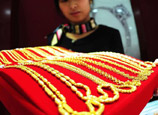
BEIJING, April 16 (Xinhua) -- The controversy towards a Chinese tourism county's collection of entry fees has illustrated how bad the result can become when authorities use arbitrary measures to seek economic gains at the cost of public interests.
From Wednesday, tourists were required to pay 148 yuan (23.9 U.S. dollars) upon entry into Fenghuang (Chinese equivalent to Phoenix), a county in Hunan Province, known for its well-preserved architecture dating back to its founding more than 300 years ago. Part of the ticket revenue goes to the local government.
The ticket policy was not welcomed by locals, who own businesses that range from ferries to home inns in the county. They believe it will deter tourists, who spend money in the town.
In response to public queries, local officials in Fenghuang proposed local businesses merge and promised to offer job training for those whose trade might be affected, leading to suspicions that the local government wanted to monopolize businesses by setting rules.
The local government in Fenghuang is apparently a loser though the new policy proved a cash cow. Nearly 2.3 million yuan worth of tickets were sold in four days after the new policy, despite only about 200 independent travelers paying their way in.
The money was made at a heavy cost: tax was down as a result of less business in the town and public anger increased.
The decision makers in Fenghuang must not have imagined the entry fee policy would trigger such a backlash though they may have fairly expected some opposition.
The controversy has led to more media coverage and online discussions as people prepare to embrace the coming May Day holiday.
Soon after the policy was introduced, local retailers protested, despite order being restored shortly after. Potential tourists said they would make a detour.
The credibility of the government of Fengshuang was further undermined after tens of thousands of Chinese Internet users started to criticize the move. They accused local government of eying fast money by sacrificing public interests and disrupting market order by abusing its administrative power.
The ticket policy, to some extent, also showed how central policies can sometimes be awfully carried out by officials at grassroots level.
The central leadership has sought to establish an administration that is more streamlined and ruled by law. The ticket policy, which was introduced without ample public debate and hearing, has run counter to the trend of China's current reform.
At a time when China is undergoing tremendous change, officials should be more conscious of the rights of the public and the role of the government before any decisions are made.



















![]()
